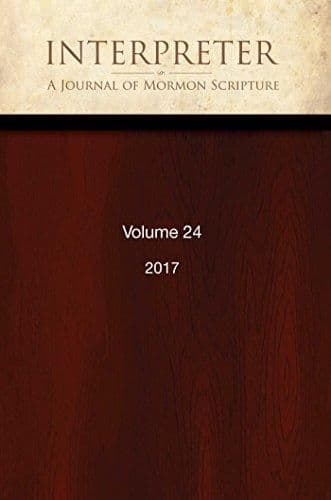Journal
“Unto the Taking Away of Their Stumbling Blocks”: The Taking Away and Keeping Back of Plain and Precious Things and Their Restoration in 1 Nephi 13–15

Title
“Unto the Taking Away of Their Stumbling Blocks”: The Taking Away and Keeping Back of Plain and Precious Things and Their Restoration in 1 Nephi 13–15
Publication Type
Journal Article
Year of Publication
2022
Authors
Bowen, Matthew L. (Primary)
Journal
Interpreter: A Journal of Latter-day Saint Faith and Scholarship
Pagination
145–170
Volume
53
Abstract
In the latter part (1 Nephi 13–14) of his vision of the tree of life (1 Nephi 11–14), Nephi is shown the unauthorized human diminution of scripture and the gospel by the Gentile “great and abominable church” — that plain and precious things/words, teachings, and covenants were “taken away” or otherwise “kept back” from the texts that became the Bible and how people lived out its teachings. He also saw how the Lord would act to restore those lost words, teachings, and covenants among the Gentiles “unto the taking away of their stumbling blocks” (1 Nephi 14:1). The iterative language of 1 Nephi 13 describing the “taking away” and “keeping back” of scripture bears a strong resemblance to the prohibitions of the Deuteronomic canon-formula texts (Deuteronomy 4:2; 12:31 [MT 13:1]). It also echoes the etiological meanings attached to the name Joseph in Genesis 30:23–24 in terms of “taking away” and “adding.” Nephi’s prophecies of scripture and gospel restoration on account of which “[the Gentiles] shall be no more [cf. Hebrew lōʾ yôsı̂pû … ʿôd] brought down into captivity, and the house of Israel shall no more [wĕlōʾ yôsı̂pû … ʿôd] be confounded” (1 Nephi 14:2) and “after that they were restored, they should no more be confounded [(wĕ)lōʾ yôsı̂pû … ʿôd], neither should they be scattered again [wĕlōʾ yôsı̂pû … ʿôd]” (1 Nephi 15:20) depend on the language of Isaiah. Like other Isaiah-based prophecies of Nephi (e.g., 2 Nephi 25:17, 21; 29:1–2), they echo the name of the prophet through whom lost scripture and gospel covenants would be restored — i.e., through a “Joseph.”
For a summary of this paper, check out Interpreting Interpreter: https://interpreterfoundation.org/interpreting-interpreter-joseph-based-stumbling-block-removal/
Bibliographic Citation
Terms of use
Items in the BMC Archive are made publicly available for non-commercial, private use. Inclusion within the BMC Archive does not imply endorsement. Items do not represent the official views of The Church of Jesus Christ of Latter-day Saints or of Book of Mormon Central.